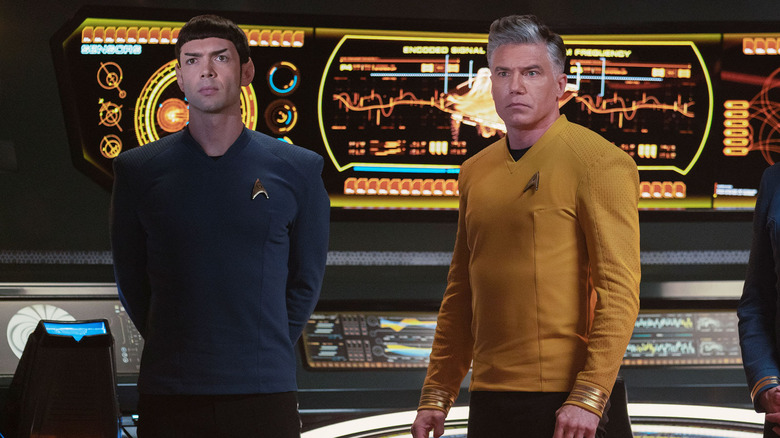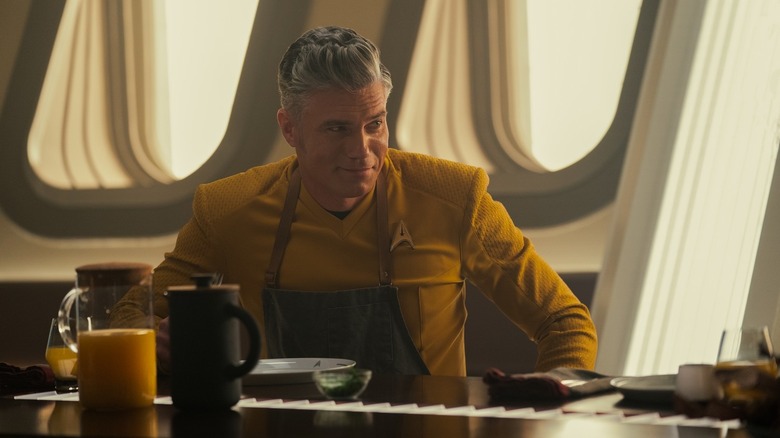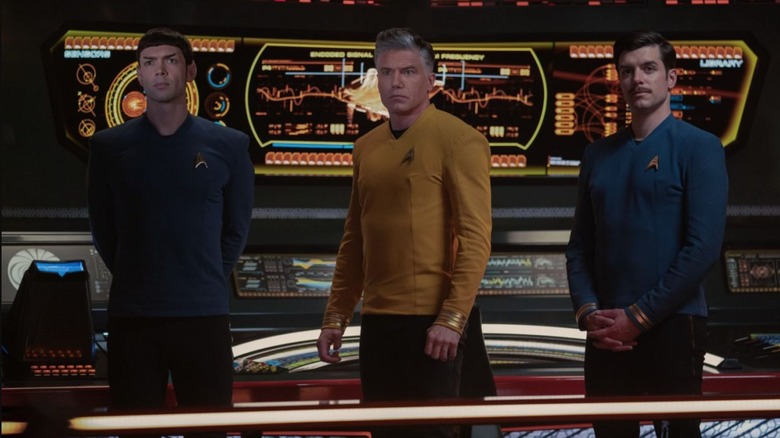Star Trek: Strange New Worlds Showrunner Henry Alonso Myers On Making The Trek Show He Always Wanted To See [Interview]
Now that the first season of "Star Trek: Strange New Worlds" has ended — with an emotional and thought-provoking time travel finale, no less — we can say it: This is the best first season of any "Trek" series. Fans of the franchise have spent decades joking that it takes the average "Star Trek" show a few years to get good, but "Strange New Worlds" came out of the gate swinging, delivering 10 episodes of such consistent quality and variety that all future shows in this universe have a new high watermark to chase.
To hear co-showrunner Henry Alonso Myers describe it, the show's success is born from one simple idea: Making the "Star Trek" show he and the rest of the show's creative team wanted to see. Along with fellow showrunner Akiva Goldsman, Myers cherry-picked elements from "Star Trek: The Original Series," "Star Trek: The Next Generation," and "Star Trek: Deep Space Nine" to inform the new show, finding a careful balance that triggers the nostalgia center of the brain without ever relying on it. You don't have to have seen any prior "Star Trek" to enjoy "Strange New Worlds," but if you have, the rewards are endless.
I recently say down with Myers over Zoom to talk about the first season of the show, the creative decisions that led to the ambitious season finale, the introduction of a new version of an old character, and much more. Our conversation contains spoilers for the season finale.
'Oh man, if only people could get to see the show that we're making'
I speak for myself and for the /Film team, and I think many "Star Trek" fans, when I say that in a year like this, a show about people trying to do the best they can has been a relief. Can you talk about your show arriving at the best-worst time?
That's really nice to hear. I came onto the show in March of 2020, so it was right as the pandemic started, and it was a real weird, crazy challenge. I was working out of my garage, so when I say I would come home every day, that was me walking out of my garage through my backyard in my house. I'd come home every day and I'd just watch old "Trek" episodes with my kids, and it was an opportunity for me to watch new and watch old stuff with them that they've never seen, and watch it through their eyes.
I just remember thinking as we were going through that terrible, challenging year, and then the year that followed, "Oh man, if only people could get to see the show that we're making." I feel like it was a good place to be able to live, in a really challenging time. I'm really delighted that people are responding to it, because [co-showrunner Akiva Goldsman] and I, we love the optimism of "Trek." I mean, even in "Deep Space Nine," which is one of my favorite shows, there are moments of optimism about the Federation. Sometimes you need that.
I haven't seen "Star Trek" fandom this united in literally years, over the love of "Strange New Worlds." Has the reaction impacted how you're approaching season 2? I know you're filming it right now. [NOTE: Production wrapped shortly after this interview concluded.]
Oh, we had almost finished writing the entire season long before the fan reaction came in. I'd love to say yes, but I will say ... look, the true north of the show has always been that we, among the folks who make the show, are all fans. We're trying to make the show that we wanted to see, it's kind of an amalgam of the shows that we loved growing up. Akiva was a huge "The Original Series" fan and I love "TOS," but I was probably more of a "The Next Generation" and "Deep Space Nine" fan. So, we found this kind of thing in the middle that really, to us, was the things we enjoyed the most about "Trek."
I have done a lot of comedy work, so it was really important to me to bring the funny back into "Trek." I know that's not always what everyone loves, but I personally love it, so there you go. I feel like it's nice to be able to have different tones in "Trek." I think it's become apparent to most of the people that we have an unbelievably talented cast who are, as well as being great dramatists, comic geniuses. We would be remiss if we didn't do some stories that allowed them to flex those muscles.
I will say that episode 8, "The Elysian Kingdom," my wife watched it with me, and she spent the first 30 minutes laughing and the last 15 minutes screaming at me, "Why am I crying at 'Star Trek?'" So, you're doing something right.
I used to work on this show, "Ugly Betty." We used to say that show was four acts of jokes, and two acts of crying. That was a little bit the same model for "Elysian."
'That felt like an opportunity for us, in terms of as makers of a prequel, to tell that story'
I want to talk about the season finale. When did you know you wanted to revisit "Balance of Terror?" Because that's a real "we're going to take a big swing on sacred ground"-type thing.
I know. Sometimes you do things because you don't know how challenging it's going to be, sometimes you do things ... I just always liked that episode. We'd had three ideas that had kind of floated around the room. We were talking about the finale and one was like, "What if we took a classic episode of 'Trek' and re-imagined it through our people? And did it with modern effects, and our characters and yada yada, and sort of updated it?" Another one was kind of about Pike's fate and I called it 'The Ghost of Pikemas Future,' which was that classic sci-fi idea of, "What happens if your older self comes back and says, 'Don't do that thing that you're about to do'"?
And then, the last one was sort of this thing that we had discussed in the room a lot, which was a little bit of an arc for Spock about ... the Spock in [the classic "Original Series" episode] "The Menagerie" is a person who is willing to go to unbelievable lengths for Captain Pike. In that episode, it's part of the surprise of it. It's like, "Why would he do all of these things?" Because of his loyalty to this person. That felt like an opportunity for us, in terms of as makers of a prequel, to tell that story.
And then, I was going to say "Balance of Terror," I wish I had a better answer, but it's always been one of my favorite "Trek" episodes. So, if I have to sit and pull dialogue out, and redo scenes, why not pick an [episode] I like?
In the season finale, the lighting on the bridge changes. You bring back that dramatic lighting from the original series: the highlights on the face with the dark backgrounds. It's a classic '60s "Trek" look. Can you talk about bringing that back, and keeping it subtle?
Chris Fisher, who directed the episode, and Magdalena Górka, who was the DP on that episode, they really wanted to return to some of the hallmarks of that original series. What's wonderful about that episode in particular is it's really a bottle show. It's a show that's set almost entirely on the Enterprise, with the exception of the stuff on the Romulan bridge. So, we wanted to give it that really distinct flavor. I worked on this other show, "The Magicians," and one of the things I learned working on that show was ... it was based on a book series, and we could find ways to pepper the series with book elements, but you didn't want that to be a barrier to entry, you sort of wanted it to be like a thing that people who loved and knew the books would enjoy.
That was a sort of skillset I developed on that show that I have tried really hard to bring into this show, which is that ... you want to put stuff in there for the folks who love "Trek," who can see it and be like, "There's a scene that Chris Fisher wholesale shot-by-shot recreation from 'Balance of Terror.'" The push in on Spock with his eyebrow and everything, we did it, but you don't need to know that, and if you do know that, it doesn't make a difference. I mean, it doesn't make a difference to the story, but if you know it, it makes everything much deeper and more fun because you realize the level at which we're sort of commenting on it. Because we're not criticizing the previous episode, we're trying to use it as a template for telling a new story.
'He wasn't coming in and doing a version of Shatner'
Speaking of new stuff, the finale introduces Paul Wesley's Captain Kirk. What I really like about what we've seen of him so far is that he's truly playing the Kirk from the original series. He's not playing the pop culture version of Kirk, who's been blown out of proportion. He's playing the professional, empathetic, assured, confident Kirk we saw in the original series.
We didn't want it to be a caricature, and one of the things you sort of learn ... it's funny, I remember having a recent conversation with one of the actors who was playing the Romulan commander, and also with watching casting all the rest of our legacy characters from "TOS" — you don't want them to do an imitation. I mean, that's actually the thing that people don't realize about [Ethan Peck''s performance as Spock] is, it's not an imitation. He's using parts of Leonard Nimoy's original performance, but he's very much embodying and making it his own, and an actor needs to be able to do that, because that's what's going to feel natural for them.
And so, it was really important for us to have a Kirk that was very much the character that we knew, but he wasn't coming in and doing a version of Shatner. You know what I mean? No one wants to see that. We have Shatner, we have the good version already, you know what I mean? We're not a show that's trying to make fun of Shatner because we're all fans, so Paul wants to be his own person. You know what I mean? That was one of the great things about how he approached it. The James Kirk that we're going to meet in season 2 is actually very ... I don't want to say he's very different, but he's younger, it's seven years earlier and he's not yet a captain. He's a lieutenant on the Farragut, and he has yet to become the person who we find in our finale. Who is different also from the James T. Kirk of the original series, because he didn't become the captain of the Enterprise. So, he's an alternative timeline Kirk.
When is [Erica Ortegas, played by Melissa Navia] getting her main episode? I think she's one character who doesn't get a main, A-storyline this season. Is it happening in season 2?
Ortegas does have an episode in season 2. We love Ortegas. One of the great things about Ortegas is that she fits so well into every story, because she's always kind of in the center of it. You know what I mean? I like to think of her as the person who gets to comment on every single story. Ortegas gets to do a bunch of things that she does in season 2 that she didn't get to do in season 1, so I'll leave it at that.
The first season of "Star Trek: Strange New Worlds" is streaming on Paramount+.



